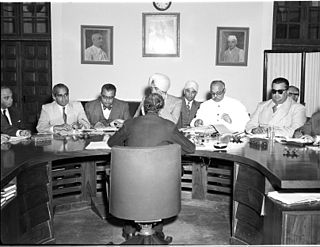A prenuptial agreement, antenuptial agreement, or premarital agreement, is a written contract entered into by a couple before marriage or a civil union that enables them to select and control many of the legal rights they acquire upon marrying, and what happens when their marriage ends by death or divorce. Couples enter into a written prenuptial agreement to supersede many of the default marital laws that would otherwise apply in the event of divorce, such as the laws that govern the division of property, retirement benefits, savings, and the right to seek alimony with agreed-upon terms that provide certainty and clarify their marital rights. A premarital agreement may also contain waivers of a surviving spouse's right to claim an elective share of the estate of the deceased spouse.
The Uniform Civil Code is a proposal in India to formulate and implement personal laws of citizens which apply on all citizens equally regardless of their religion. Currently, personal laws of various communities are governed by their religious scriptures. Personal laws cover marriage, divorce, inheritance, adoption and maintenance. While articles 25-28 of the Indian Constitution guarantee religious freedom to Indian citizens and allow religious groups to maintain their own affairs, article 44 expects the Indian state to apply directive principles and common law for all Indian citizens while formulating national policies.

India is a federal union comprising 28 states and 8 union territories, for a total of 36 entities. The states and union territories are further subdivided into 806 districts and smaller administrative divisions.

The legal system of India consists of civil law, common law, customary law, religious law and corporate law within the legal framework inherited from the colonial era and various legislation first introduced by the British are still in effect in modified forms today. Since the drafting of the Indian Constitution, Indian laws also adhere to the United Nations guidelines on human rights law and the environmental law. Personal law is fairly complex, with each religion adhering to its own specific laws. In most states, registering of marriages and divorces is not compulsory. Separate laws govern Hindus including Sikhs, Jains and Buddhist, Muslims, Christians, and followers of other religions. The exception to this rule is in the state of Goa, where a uniform civil code is in place, in which all religions have a common law regarding marriages, divorces, and adoption. On February 7, 2024, the Indian state of Uttarakhand also incorporated a uniform civil code. In the first major reformist judgment for the 2010s, the Supreme Court of India banned the Islamic practice of "Triple Talaq". The landmark Supreme Court of India judgment was welcomed by women's rights activists across India.

Rajpramukh was an administrative title in India which existed from India's independence in 1947 until 1956. Rajpramukhs were the appointed governors of certain Indian provinces and states.
India since its independence in 1947 has been a secular state. The secular values were enshrined in the constitution of India. India's first prime minister Jawaharlal Nehru is credited with the formation of the secular republic in the modern history of the country. With the Forty-second Amendment of the Constitution of India enacted in 1976, the Preamble to the Constitution asserted that India is a secular nation. However, the Supreme Court of India in the 1994 case S. R. Bommai v. Union of India established the fact that India was secular since the formation of the republic. The judgement established that there is separation of state and religion. It stated "In matters of State, religion has no place. Any State government which pursues nonsecular on policies or nonsecular course of action acts contrary to the constitutional mandate and renders itself amenable to action under Article 356". Furthermore, constitutionally, state-owned educational institutions are prohibited from imparting religious instructions, and Article 27 of the constitution prohibits using tax-payers money for the promotion of any religion.

Since independence, the Indian National Congress has participated in elections, Lok Sabha and Vidhan Sabha. This article shows a list of the results of the elections for Congress.

The following outline is provided as an overview of, and topical guide to, India:
The Goa Civil Code, also called the Goa Family Law, is the set of civil laws that governs the residents of the Indian state of Goa. The Goan civil code was introduced after Portuguese Goa and Damaon were elevated from being mere Portuguese colonies to the status of a Província Ultramarina. The Goan civil code is a Indianised variant of the Portuguese legal system that draws largely from the Napoleonic Code, a common legal system in a number of Continental European nations. Indian law mostly derives from English common law that was formulated and applied in British India, and remains pegged to developments in the "Charter of the British Commonwealth". With a number of amendments, following the Partition of India, Indian laws as a whole, have religion-specific civil codes that separately govern adherents of different religions; and also has caste reservations. Goa and Damaon are an exception to that rule, in that a single code governs all the native Goans and the native Damanese of Damaon, Diu & Silvassa, irrespective of affiliation to religion, ethnicity and social strata. The English translation of the civil code is available on the Government of Goa's e-Gazette dated 19/10/2018.
Modern Hindu law is one of the personal law systems of India along with similar systems for Muslims, Sikhs, Parsis, and Christians. This Hindu Personal Law or modern Hindu law is an extension of the Anglo-Hindu Law developed during the British colonial period in India, which is in turn related to the less well-defined tradition of Classical Hindu Law. The time frame of this period of Hindu law begins with the formal independence of India from Great Britain on August 14, 1947, and extends up until the present. While modern Hindu law is heralded for its inherent respect for religious doctrines, many still complain that discrimination still pervades the legal system, though efforts to modernize and increase the legal rights of the marginalized have been made.
The Hindu Minority and Guardianship Act was established in 1956 as part of the Hindu Code Bills. Three other important acts were also created during this time: the Hindu Marriage Act (1955), the Hindu Succession Act (1956), and the Hindu Adoptions and Maintenance Act (1956). All of these acts were put forth under the leadership of Jawaharlal Nehru, and were meant to modernize the prevailing Hindu legal tradition. The Hindu Minority and Guardianship Act of 1956 was meant to enhance the Guardians and Wards Act of 1890, not serve as its replacement. This act specifically serves to define guardianship relationships between adults and minors, as well as between people of all ages and their respective property.
The Special Marriage Act, 1954 is an Act of the Parliament of India with provision for secular civil marriage for people of India and all Indian nationals in foreign countries, irrelevant of the religion or faith followed by either party. The Act originated from a piece of legislation proposed during the late 19th century. Marriages solemnized under Special Marriage Act are not governed by personal laws and is considered to be secular.
The Hindu code bills were several laws passed in the 1950s that aimed to codify and reform Hindu personal law in India, abolishing religious law in favor of a common law code. The Indian National Congress government led by Prime Minister Jawaharlal Nehru successfully implemented the reforms in 1950s. This process was started during the British rule of India.
The Hindu Marriage Act (HMA) is an act of the Parliament of India enacted in 1955. Three other important acts were also enacted as part of the Hindu Code Bills during this time: the Hindu Succession Act (1956), the Hindu Minority and Guardianship Act (1956), the Hindu Adoptions and Maintenance Act (1956).
India does not recognise same-sex marriage, civil unions or other forms of partnerships, but provides some limited legal recognition to cohabiting same-sex couples in the form of live-in relationships. Several same-sex couples have married in traditional Hindu ceremonies since the late 1980s; however, these marriages are not registered with the state and couples do not enjoy all the same rights and benefits as married opposite-sex couples. The Supreme Court of India in August 2022 provided social security rights to those in same-sex live-in relationships while also recognising same-sex couples as being part of a "family unit".

A union territory is a type of administrative division in the Republic of India. Unlike the states of India, which have their own governments, union territories are federal territories governed, in part or in whole, by the Union Government of India. There are currently eight union territories in India: Andaman and Nicobar Islands, Chandigarh, Dadra and Nagar Haveli and Daman and Diu, Delhi (NCT), Jammu and Kashmir, Ladakh, Lakshadweep and Puducherry.

The States Reorganisation Act, 1956 was a major reform of the boundaries of India's states and territories, organising them along linguistic lines.
All the Muslims in India are governed by the Muslim Personal Law (Shariat) Application Act, 1937. This law deals with marriage, succession, inheritance and charities among Muslims. The Dissolution of Muslim Marriages Act, 1939 deals with the circumstances in which Muslim women can obtain divorce and rights of Muslim women who have been divorced by their husbands and to provide for related matters. These laws are not applicable in the states of Goa, where Goa civil code is applicable for all persons irrespective of religion and state of Uttarakhand. These laws are not applicable to Indians, including Muslims, who married under the Special Marriage Act, 1954.
The Indian Christian Marriage Act of 1872 is an act of the Parliament of India regulating the legal marriage of Indian Christians. It was enacted on 18 July 1872 and applies throughout India, excluding the territories which, immediately before the 1st November, 1956, were comprised into the States of Kerala and Manipur, and the Union Territories of Jammu and Kashmir and Ladakh.
The Uniform Civil Code of Uttarakhand Act, 2024 is a piece of legislation designed to establish a unified set of personal laws governing matters such as marriage, divorce, adoption, inheritance, and maintenance for all citizens of Uttarakhand, irrespective of their religion, gender, caste, or sex.





